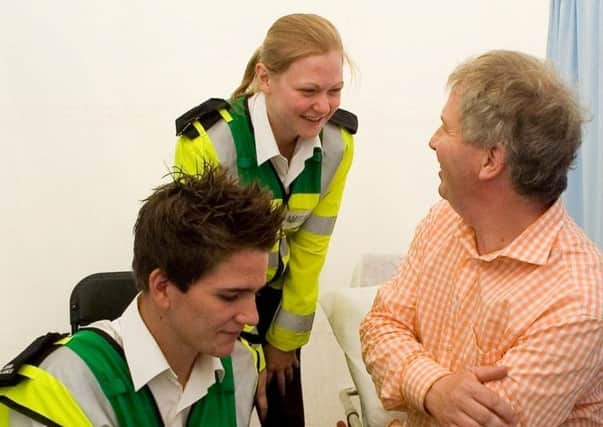ST JOHN AMBULANCE: How to deal with stings and signs to look out for


Usually a sting from a bee, wasp, or hornet are not serious and are more painful than dangerous.
But with any insect bite or sting it is important to look for signs of an allergic reaction.
Take the following simple steps to help:
• Reassure and calm the casualty down.
Advertisement
Hide AdAdvertisement
Hide Ad• There will be pain and possibly some redness and swelling around the site of the sting.
• If the sting is visible, brush or scrape it off. You could use the blunt edge of a knife or a credit card for instance.
Please don’t use tweezers as you risk squeezing more poison into the wound.
• Apply an ice pack or cold compress for at least ten minutes, and if possible raise the affected part.
Advertisement
Hide AdAdvertisement
Hide Ad• If swelling and pain persist advise the casualty to see their doctor.
• Stings to the mouth and throat can be dangerous.
There is a risk of the tissues in the mouth and throat swelling which could cause the airway to become blocked.
• Sucking on an ice cube, or an ice cream or lolly for instance for children, or sipping cold water will help to prevent any swelling.
• However, if the swelling starts to develop and breathing becomes difficult then arrange for medical help immediately.
Advertisement
Hide AdAdvertisement
Hide AdSome people suffer severe allergic reactions to insect bites and stings.
If the casualty shows any sign of impaired breathing or swelling to the face, neck, tongue, mouth or lips or shows a wide spread rash then dial 999 or 112 for an ambulance.
• For those looking for quick, easily accessible first aid information, the St John Ambulance app is available free on smartphones and the website (www.sja.org.uk) offers demo videos, an interactive game, and lots of free advice. For more information about first aid courses please call 0303 003 0101.
---
Don’t miss out on all the latest breaking news where you live.
Advertisement
Hide AdAdvertisement
Hide AdHere are four ways you can be sure you’ll be amongst the first to know what’s going on.
1) Make our website your homepage
2) Like our Facebook page
3) Follow us on Twitter
4) Register with us by clicking on ‘sign in’ (top right corner). You can then receive our daily newsletter AND add your point of view to stories that you read here.
And do share with your family and friends - so they don’t miss out!
Always the first with your local news.
Be part of it.